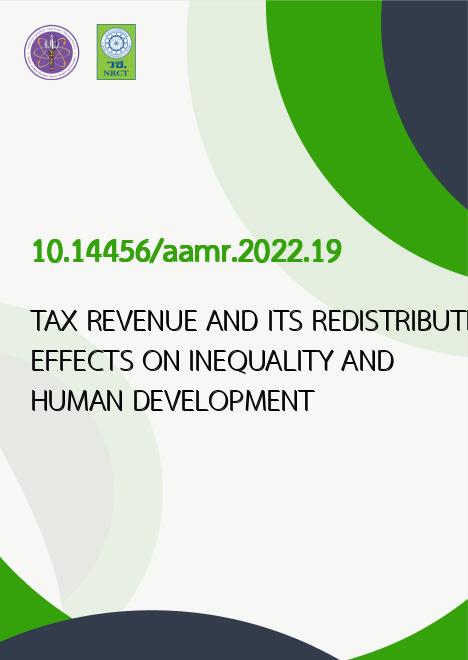
|
TAX REVENUE AND ITS REDISTRIBUTIVE EFFECTS ON INEQUALITY AND HUMAN DEVELOPMENT |
|---|---|
| รหัสดีโอไอ | |
| Creator | Angkana ASAWASAKULKRAI |
| Title | TAX REVENUE AND ITS REDISTRIBUTIVE EFFECTS ON INEQUALITY AND HUMAN DEVELOPMENT |
| Publisher | Asian Administration and Management Review |
| Publication Year | 2565 |
| Journal Title | Asian Administration and Management Review |
| Journal Vol. | 5 |
| Journal No. | 2 |
| Page no. | 104-118 |
| Keyword | Tax, Income, Consumption, Inequality, Development |
| URL Website | https://so01.tci-thaijo.org/index.php/AAMR/index |
| Website title | https://so01.tci-thaijo.org/index.php/AAMR/article/view/262012 |
| ISSN | 2730-3683 |
| Abstract | Taxation is a contentious public policy issue. While it is mostly viewed as a means for governments to raise revenue, in recent decades, due to the widening income gaps, tax policy has been intensely debated as both the problem causing inequality and solution to reduce inequality. The main objective is thus to investigate how tax revenue contributes to inequality. Quality of life is employed as a proxy variable, measured by the reduction of income inequality and human capital development. Tax revenues, as independent variables, are categorized into overall tax revenue, personal income tax revenue, and consumption tax revenue. The study is designed as a cross-country quantitative analysis, using dynamic panel data from 2009-2018 with the population of 75 countries. The findings reveal that higher tax revenue does not translate into better quality of life. In fact, higher levels of personal income tax revenue appear to lead to higher income inequality despite its progressive structure. Similar results are found with human capital development for which the findings uncover the adverse relationships with all three types of tax revenues. Also, higher levels of consumption-based tax revenue burdens low-income individuals, resulting in higher inequality and lower human development. Hence, the results suggest that personal income tax progressivity and reliance on consumption-based taxation have undesirable outcomes that have exacerbated income inequality. Therefore, public policy should rely less on income progressivity and consumption-based taxes and focus instead on other aspects of policy implementation and other welfare-improving policies that can tackle the issues more effectively. |